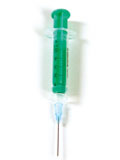Health
Emergency Services

If you are in urgent need of medical attention at the weekend or during the night then you can report to the "Ambulanz" or "Notaufnahme" ward (Accident and Emergency) in hospitals or call a doctor. The addresses and telephone numbers of doctors can be found in the local newspapers under "Notdienst" or "Ärztlicher Notdienst", or in the telephone directory.
The emergency numbers in Germany are 110 (Police) and 112 (Fire Brigade).
Doctors
In Germany there are numerous types of doctors, from GP’s ("Allgemeinmediziner") to specialists ("Fachärzte") such as eye specialists, dermatologists, etc. Most people have a GP as their "family doctor" ("Hausarzt"). This doctor can transfer people to specialists if necessary. In certain cases you can visit a specialist without consulting your family doctor first. Doctors have specific visiting hours when patients can seek advice. It is always recommendable to make an appointment as waiting times can be long. If a doctor is needed urgently, it is not necessary to make an appointment. The names and addresses of doctors can be found in the local telephone directory. The Yellow Pages ("Gelbe Seiten") list specialists. Regular preventative medical check-ups are also recommended. This is particularly recommended for small children, the dentist and for people over the age of 35. Doctors, hospitals and health offices provide information on preventative medical check-ups.
Since the 1st of January 2004 you now have to pay – if you are insured with a public health insurer – a practice fee of ten euros each time you visit your doctor for the first time within each yearly quarter. This is regardless of whether you are visiting your general practitioner, a specialist doctor or a psychotherapist. You do not have to pay a fee if you have been referred by another doctor. Children and juveniles under the age of 18 are generally exempt from paying any additional charges and the practice fee. No practice fee is charged for two dental check-ups per year. You also do not have to pay a practice fee for precautionary check-ups and immunisations.
Hospitals
All hospitals, with the exception of some private clinics, are open to all insured patients. Normally doctors transfer patients to a hospital. The health insurer covers the costs of hospital stays. Patients do, however, pay a certain amount of the hospital bills.
Inoculations
Doctors, health insurers and local health offices give advice on inoculations, especially for babies and small children.
Pharmacies and Medicines

Medicines can only be bought in Germany at pharmacies ("Apotheken"). Most medicines require a prescription from a doctor. The prescription drugs needed are written down on a prescription ("Rezept") by the doctor and taken to the pharmacy. The prescription is taken to the pharmacy by the patient and the pharmacist issues the medicines. A nominal fee is paid for each drug depending on the cost of each medicine. Low-income households are exempt from paying these fees. The exemption can be obtained from the health insurer. Some painkillers, such as headache tablets, are available at pharmacies without a prescription.
Private patients (see chapter ![]() Health Insurance) must pay the full price of the medicines and then claim this money back from their insurer.
Health Insurance) must pay the full price of the medicines and then claim this money back from their insurer.
There is always at least one pharmacy open in every area day and night. This is called the "Notdienst". In rural communities people may have to travel to the nearest village or town. The addresses of the pharmacies that are open on specific days are listed in local newspapers under "Apotheken-Notdienst". All pharmacies always have a sign to tell customers which pharmacy is open on which day.
AIDS

Questions relating to HIV or AIDS can be answered by your GP, at your local health office or at special clinics and advice centres. Condoms (in German referred to as "Kondome", "Präservative" or "Pariser") are available in supermarkets, drug stores, pharmacies, at many petrol stations and in vending machines in some public toilets. 030/76900870 is the number of the national advice centre. All calls are dealt with discretion and callers remain anonymous (Addresses are available in AIDS Advice Centres; see chapter ![]() Organisations and Contacts).
Organisations and Contacts).
Contraception and Family Planning
Questions on contraception and family planning can be discussed with your doctor or various advice centres, for instance "Pro Familia" or certain offices of the "Arbeiterwohlfahrt", the "Caritas" (Catholic Church) or the "Diakonisches Werk" (Protestant Church). The addresses and telephone numbers are listed in local telephone directories or in local newspapers under "Beratungsstellen". "Pregnancy tests" can be purchased in pharmacies.
Pregnancy

Pregnant women who hold health insurance have a right to special medical treatment and social support, including regular medical check-ups, medical care, help from midwives, supplies of drugs, the right to give birth in hospital and maternity allowance.
Advice can be sought from doctors and at special offices for pregnant women called "Schwangerschaftsberatungsstellen", which are provided, for example, by the "Arbeiterwohlfahrt" ("AWO"), the "Caritas", the "Diakonisches Werk", the "Deutsches Rotes Kreuz", the "Deutsche Paritätische Wohlfahrtsverband" ("DPWV"), "Pro Familia" and health offices.
Abortion ("Schwangerschaftsabbruch" or "Abtreibung") is permitted in Germany but only under certain conditions. 1.) For medical reasons at any stage during pregnancy, 2.) Cases with a criminal background (for instance if a woman was raped) until the 12th week. 3.) For personal / social reasons until the 12th week. This can only happen if the pregnant woman requests an abortion and obtains a certificate from a recognised pregnancy and abortion advice centre (the advice centre is called "Schwangerschafts-Konflikt-Beratung" or "Pregnancy Conflict Advice"). Nobody can force a woman to have an abortion. This is illegal. Information can be obtained at advice centres or from your doctor or from "Pro Familia", the "Arbeiterwohlfahrt", "Donum Vitae" or the "Diakonisches Werk". The addresses of all these offices are listed in the telephone directory or in your local newspapers under "Beratungstellen".
